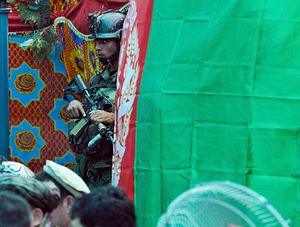Afghanistan’s fledgling democracy is going through another crucial test as the presidential race is becoming more complex. The upcoming presidential election is the country’s most significant political event with a tough competition emerging between former national security advisor Mohammad Hanif Atmar and President Ashraf Ghani.
This year’s election faces several challenges. In addition to security threats by the Taliban and ISKP, fear of fraud is a the major issue which needs particular attention. Given the parliamentary elections experience, it is difficult to imagine a fraud-free election. However, vote rigging on a massive scale has high political stakes and could jeopardize the entire situation. In Afghanistan, the threat of violence and ability to mobilize a crowd has often been a tool used to press political negotiations and pave the way for a compromise or share of the power.
The 2014 presidential election was tainted by accusations of widespread cheating and fraud. Consequently, bringing the country into a long-term political crisis and to the brink of ethnic conflict. The situation was calmed by then-U.S. Secretary of State John Kerry who brokered a deal between Ghani and Abdullah Abdullah. The creation of the new but unconstitutional position of CEO split power between the two men. Similarly, the recent chaotic parliamentary elections though hailed as a success in general, were tainted with widespread accusations of rigging, mismanagement, and corruption. The Afghan presidential elections were supposed to take place on April 20, however according to the Independent Election Commission for the sake of better organization the elections were delayed for three months and are now scheduled for July 20, 2019.
Fifteen candidates, including Ghani, Abdullah, Atmar, former NDS Chief Rahmatullah Nabil, and Hizb-e-Islami leader Gulbuddin Hekmatyar have registered to stand for the presidency. Registration of candidates closed on Sunday.
The mostly Tajik Jamiat party is divided. Its leading figures, including Atta Mohammad Noor, Ismail Khan, Sattar Murad, and Bismillah Mohammadi, announced their support for Atmar. Younas Qanoni has been selected as his running mate. A smaller portion of the party, including Salahuddin Rabbani, is backing Abdullah. Ahmad Wali Massoud is another candidate from the same party running for the presidential seat.
Similarly, in the Hazara community influential personalities like Mohaqiq, and Berna Karimi are supporting Atmar while Karim Khalili has parted ways with Abdullah. Sarwar Danish, second vice president, has joined Ghani as his running mate.
The election will be challenging for Ghani as he has lost many of those who backed him in the 2014 elections. Atmar, as his strong supporter in the last election considered as the backbone of the government and right hand of the president, has the backing and representation of major ethnic groups and leading individuals throughout the country. Atmar has secured enormous amounts of goodwill inside the country and among the international community as a charismatic leader and a terrific manager. Moreover, he has consolidated a strong group of influential technocrats and politicians. Beyond Atmar, Ghani also has to worry about a number of political figures which have come together under the umbrella of a relatively divided Grand National Coalition of Afghanistan against him.
Ethnic nationalism is going to be an integral part of the presidential election campaign. Ghani’s ethnic card in the second round of elections in 2014 proved useful for him. Moreover, his famous slogans against graft, turning Afghanistan into a regional economic hub and taking the country out of the ongoing insurgency help propel him to victory. Currently, his rivals are trying to turn the tables on him, accusing Ghani of micromanagement and failing to bring security and greater employment over the past four years.
Even though Ghani has failed to bring security, broker a deal with the Taliban and produce jobs on a mass scale, he will argue that he deserves another term as the peace process and other tasks remain unaccomplished.
In the upcoming election, Ghani has two major cards to play. One is the ongoing peace talks with the Taliban. Ghani will need to accelerate the peace talks and build up an alliance inclusive of the Taliban. However, peace talks are mainly in the hands of U.S. envoy Zalmay Khalilzad as the Taliban have rejected direct talks with the Afghan government. Instead, they prefer continuing talks with the United States. It seems unlikely that Ghani can do much to broker a deal with the Taliban before election day. Ghani’s second card is the possibility to broker a deal with his tough rival, Atmar, who has been successful in gathering a strong coalition. In the current situation this option also seems unlikely.
The upcoming presidential election is very important for Afghanistan, the United States, and its NATO partners. Credible and transparent elections with a peaceful transition of power remains a priority at a time when the hard gains of the past 17 years are at stake with the worsening security situation, stalled peace talks with the Taliban, coupled with a fragile democracy. Discredited polls or another crisis would only worsen the situation. The country remains fragmented around ethnic lines and people are frustrated. Failed elections could hand a major victory to the Taliban.
Mr. Ahmad Shah Katawazai is the member of the Academy of Sciences of Afghanistan and formerly worked at the Afghan Embassy Washington D.C. Mr. Katawazai has a master degree in Global Security Studies from Johns Hopkins University and a master in International Legal Studies from American University. Katawazai is a published writer. His writings have been published in The Diplomat, Foreign Policy Journal, The Hill etc. You can follow him on twitter @askatawazai

































